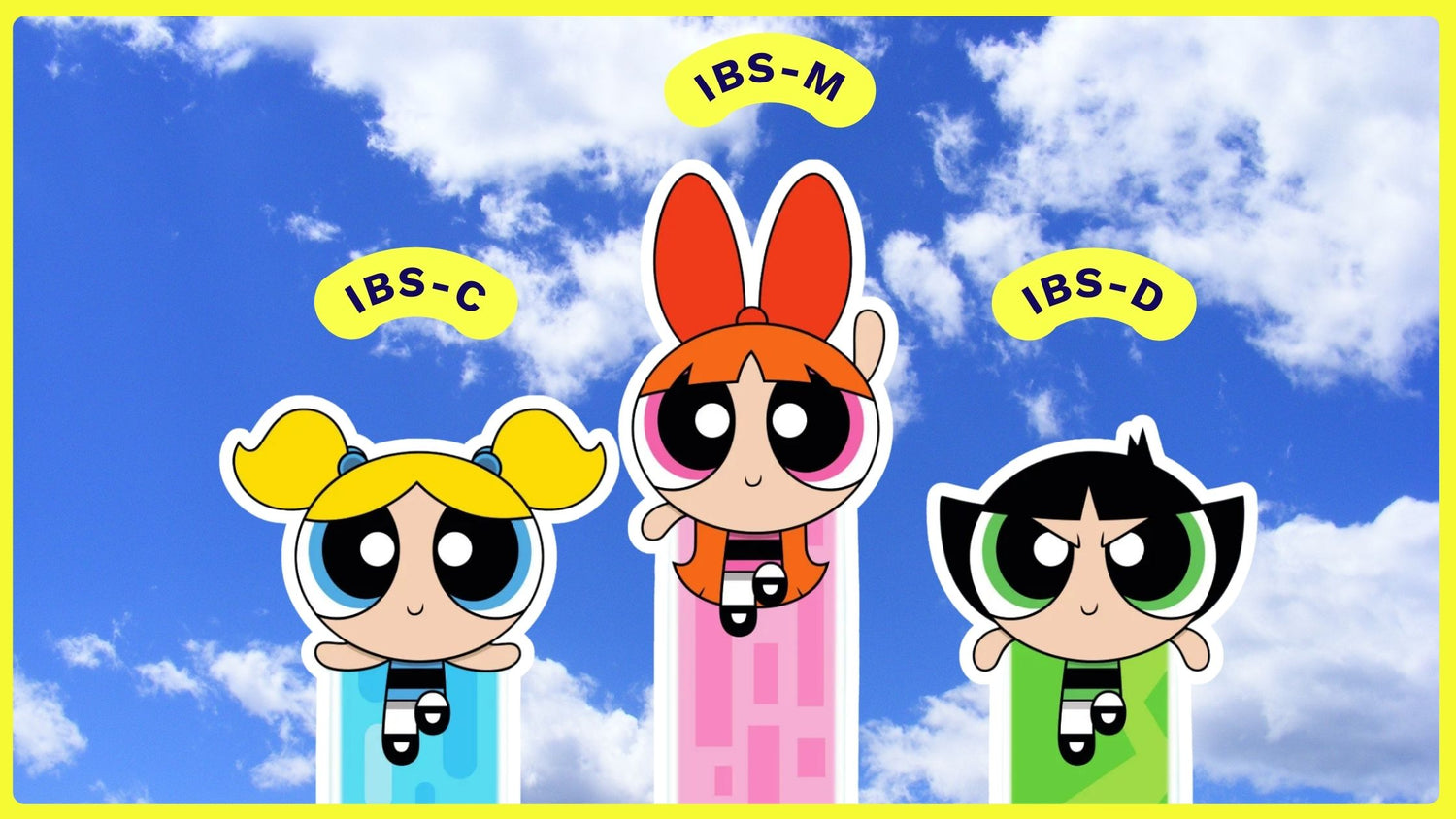Most of us have heard of irritable bowel syndrome, which is usually shortened to IBS. It’s a common gut health issue affecting up to 11% of the population globally. This might not sound like much, but it equates to around 880,000,000 people!
IBS can lead to all sorts of symptoms, including gas, bloating, constipation, and diarrhoea. In severe cases, it seriously impacts gut health and can disrupt people’s daily lives.
There are three different types of irritable bowel syndrome - IBS-C, IBS-D, and IBS-M. Each one is a unique branch of IBS and is characterised by different symptoms.
In this article, we are going to look more closely at each of the different types of IBS and how each one manifests in its own ways. We will also cover some helpful tips for managing the pesky symptoms of irritable bowel syndrome so you can deal with them more easily if you have this chronic digestive health issue.
What is IBS?
Irritable bowel syndrome is one of the most common digestive health disorders across the world. It causes poor gut health and leads to a number of symptoms, including abdominal bloating, gas, cramps, diarrhoea, constipation, and a feeling of incomplete evacuation (your bowels not being fully empty after going to the toilet). Some people also experience fatigue, anxiety, mood changes, and sleep issues when their IBS is flaring up.
The exact cause of IBS is unknown, but many say the main cause is an intolerance to certain foods, known as FODMAP foods. FODMAP is an acronym for fermentable oligosaccharides, disaccharides, monosaccharides, and polyols.
These are just fancy words for different types of carbohydrates that are found in foods like fruits, vegetables, cereals, bread, beans, lentils, and dairy products. Avoiding these foods can, therefore, be a great way to manage your IBS, but more on this and other natural remedies for irritable bowel syndrome later!
Other proposed causes of IBS include:
- Gut hypersensitivity (increased sensitivity of the gut lining)
- Gastroenteritis (a bacterial or viral infection in the gut)
- Some medications, such as antibiotics, that disrupt the gut microbiome
The diagnosis of IBS is currently based on the reported symptoms. If you suspect that you have IBS and consult a doctor or specialist nurse in your area, they will ask you to relay the symptoms you're experiencing.
If you appear to have all of the classic IBS symptoms, such as bloating, gas, diarrhoea, and constipation, they might give you a diagnosis of irritable bowel syndrome. This is particularly true if your symptoms have been present for more than six months and your bowel habits have changed significantly in this time.
As part of the diagnosis, your doctor or specialist nurse will rule out other common digestive disorders, such as inflammatory bowel disease (IBD) and coeliac disease. To rule these conditions out, they might run some blood tests or book you in for an MRI scan, stool test, CT scan, or colonoscopy.
What Are the Different Types of IBS?
As mentioned above, there are three main types of irritable bowel syndrome:
- IBS-C, which stands for constipation
- IBS-D, which stands for diarrhoea
- IBS-M, which is ‘mixed’ IBS
IBS with constipation (IBS-C) is exactly what it sounds like. It’s IBS with a tendency to manifest in constipation. Usually, if you have IBS-C, you will struggle to go to the toilet or have very infrequent bowel movements with a hard or lumpy stool.
If you have IBS-D, you’re on the opposite end of the spectrum. You might have very loose or watery stools and experience an urgency to go to the toilet when you’re out and about.
In mixed IBS, you can end up dealing with both constipation and diarrhoea, and you might swing between the two quite frequently. Not fun!
Generally, the split between IBS-C, IBS-D, and IBS-M is pretty even, but the numbers vary from year to year. Because of this variation and the significant differences in the symptoms of IBS-C, IBS-D, and IBS-M, it can be tough for healthcare professionals like doctors and dieticians to give advice on how to manage IBS.
It also makes it almost impossible for drug developers to create a drug or therapy that will treat every single person with IBS. As of the current day, there are different drugs used to treat the symptoms of each type of IBS, such as laxatives for those with IBS-C and anti-diarrhoeal medications for those with IBS-D. Digestive enzymes and probiotics are also commonly recommended.
Thankfully, there are some general lifestyle changes and natural remedies that work for all types of IBS and can make the symptoms easier to manage. Keep reading because we’ve covered some of the most helpful things for tackling IBS below.
Tips to Manage IBS and IBS Symptoms
If you’ve got IBS, whether it’s the type that tends towards constipation, diarrhoea, or a bit of both, try the following natural remedies to relieve your symptoms and improve your quality of life.
Choose low-FODMAP foods
High-FODMAP foods contain a lot of fermentable carbohydrates, which are broken down (fermented) by the bacteria in your gut when you eat them.
Fermentation is a process that causes the production of gas, such as carbon dioxide (CO2). Consuming a bunch of high-FODMAP foods in your diet can, therefore, cause a build-up of gas in your lower digestive tract, leading to bloating, burping, flatulence, and abdominal cramps.
Those with IBS (who are prone to bloating) should avoid high-FODMAP foods and, instead, go for foods that are low in FODMAPs. So, what does this mean?
Well, it means you should avoid the following foods:
- Vegetables - onions, garlic, asparagus, broccoli, beetroot, Brussels sprouts, and cabbage
- Fruits - apples, pears, plums, watermelon, and mangos
- Wholegrains - wheat-based cereals and rye-based products
- Dairy products - cheese, yoghurt, and cow’s milk
And it also means you should focus your diet on the following low-FODMAP foods:
- Vegetables - carrots, green beans, lettuce, parsnips, bell peppers, spinach, swede, and tomatoes
- Fruits - bananas, blueberries, cranberries, grapes, grapefruit, orange, passionfruit, and strawberries
- Whole grains - gluten-free bread and cereals, rice, and oats
- Dairy-free products – dairy-free cheese, soy yoghurt, and plant-based milk
Take a probiotic supplement each day
The word probiotics is one given to beneficial bacteria, such as Bifidobacterium, Lactobacillus, Enterococcus, and Streptococcus, which are found naturally in your gut but can also be found in probiotic supplements.
Probiotics perform a variety of essential functions in the gut, including the metabolism of ingested foods and the absorption of nutrients from these foods into the bloodstream. In a healthy individual, there are lots of probiotic bacteria in the colon that perform these functions, but in somebody with IBS, their numbers might not be optimal, leading to poor digestive health and function.
Adding a probiotic supplement to your daily routine can boost the levels of probiotic bacteria in your gut to support your digestive health. If you have IBS, a handy probiotic supplement could be enough to boost your probiotic bacteria and balance out your gut microbiome.
At Wild Dose, we have the perfect probiotic supplement, A Dose For Bloating, which has been tested and refined to ensure that it’s exactly what our customers need. Whether you have an IBS diagnosis, general gut health issues, or only occasional bloating, it’s worth keeping a pack of A Dose For Bloating on hand for when you need it.
Our probiotic supplement contains two billion probiotic bacteria, seven types of digestive enzymes, and seven different plant extracts to create a formula that will eliminate abdominal bloating, gas, and discomfort. You only need to take one capsule a day to get all of the benefits of A Dose For Bloating
Keep your stress to a minimum
It’s much easier said than done, but reducing your stress can make a huge difference when it comes to managing IBS effectively. Stress exacerbates stomach issues and is one of the key factors that can worsen irritable bowel syndrome, as it can increase inflammation in the gut and slow down digestion, increasing the risk of bloating and abdominal discomfort.
It’s difficult to manage stress in the modern day. Everybody has a million things on their to-do list (slight exaggeration, but you get the point!) and several things to worry about at once. However, if there are ways to reduce your stress (both your physical and psychological stress), you’re onto a winner!
Reducing stress can alleviate bloating and abdominal pains and improve your bowel regularity. It can also promote a better overall quality of life by lifting your mood and allowing you to focus your energy on the most important things in your life.
Cutting down your physical stress might involve reducing the frequency of your workouts or lowering their intensity. It might involve delegating the housework or gardening to somebody else so you can relax and allow your body to rest.
Lowering your psychological stress will look more like cutting back on your workload, not answering emails past 5 pm if you have a traditional office job, or not creating a lengthy to-do list every morning. You can improve your stress management by practising deep breathing and meditation regularly, even if just for a few minutes a day.
You will notice that, as you start to feel less stressed, your IBS symptoms will lessen in severity, and your digestive health will improve.
Eat little and often
Consuming high volumes of food at once can increase bloating and abdominal discomfort, especially if these foods are gas-producing foods and you have irritable bowel syndrome. Your digestive system needs time to digest the foods you’ve eaten, and it can’t do so efficiently if you bombard it with huge meals!
Eating smaller amounts of food more frequently throughout the day can help to tackle IBS-related bloating. It allows time for your stomach and intestines to break down the food you’re eating and absorb the nutrients before your next meal. It also reduces gut transit time so the bacteria inside your gut don’t ferment ingested foods too much and produce lots of gas.
If you’re not used to eating little meals and snacks throughout the day, it might feel a bit tedious trying to eat something small every few hours. However, doing so could make all the difference to your IBS symptoms and long-term management. Pack snacks in your bag when you’re heading to work or school, and prepare healthy meals at the start of the week that you can split to create several small portions.
Note that if you’re eating more frequently than usual, you will need to reduce the portion sizes of each meal and snack to avoid overconsumption. Whilst there is absolutely nothing wrong with eating a bit more than usual or indulging in bigger portions every so often, make sure you’re fuelling your body with the right number of calories and lots of nutrients to maintain a healthy weight.
Avoid trigger foods
We've already spoken about the importance of avoiding certain foods when you have IBS. However, avoiding FODMAPs is just a general word of advice for anybody with irritable bowel syndrome. You can get more specific with your IBS management by identifying the specific foods that trigger your IBS and make your symptoms worse.
Common trigger foods for those who have IBS include spicy foods, fatty foods, and highly processed foods. Alcohol and caffeine can also be common culprits for worsening the symptoms of irritable bowel syndrome. However, you might find that other foods cause your IBS to worsen more than others. Consider keeping a food diary that documents the foods you’re eating and your gut-related symptoms so you can easily identify patterns and trends to identify your trigger foods.
There you have it! Lots of amazing strategies that you can try when you’re dealing with the nasty symptoms of irritable bowel syndrome. These strategies are all the best natural remedies, so you won’t need to reach for any pills and tablets to keep your gut happy and healthy!









